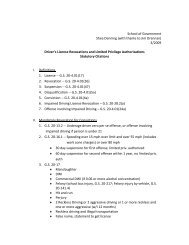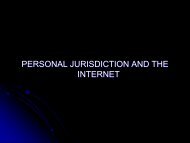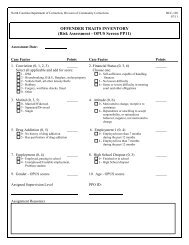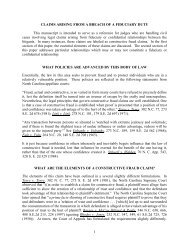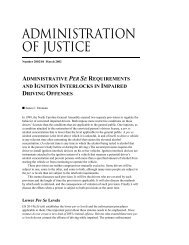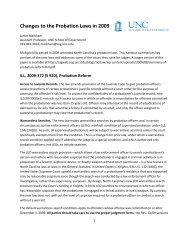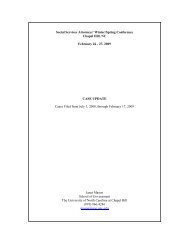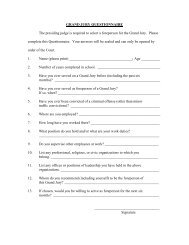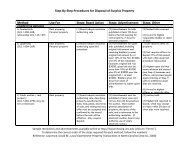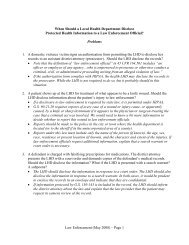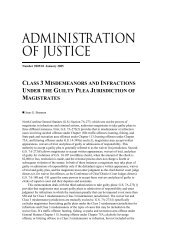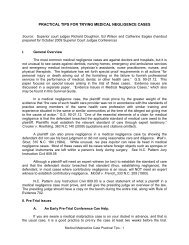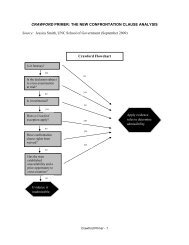Guardianship of Incapacitated Adults: A Summary of North Carolina ...
Guardianship of Incapacitated Adults: A Summary of North Carolina ...
Guardianship of Incapacitated Adults: A Summary of North Carolina ...
Create successful ePaper yourself
Turn your PDF publications into a flip-book with our unique Google optimized e-Paper software.
Fundamentals <strong>of</strong> Social Services Law<br />
November, 2004<br />
John L. Saxon<br />
Institute <strong>of</strong> Government, UNC-CH<br />
preparation, use <strong>of</strong> telephone, etc.) may be useful in determining whether or<br />
to what extent the respondent is unable to manage his or her affairs.<br />
3. The fact that a person is unable to care for himself or herself without the<br />
assistance <strong>of</strong> others due to a physically disability or impairment is not<br />
sufficient to support a finding <strong>of</strong> incapacity unless he or she also lacks the<br />
mental capacity to make appropriate decisions that would enable him or her<br />
to obtain necessary care or assistance from others.<br />
4. As in the case <strong>of</strong> cognitive capacity, the issue in assessing the respondent’s<br />
functional capacity is not whether the respondent’s functional abilities are<br />
impaired, subaverage, or suboptimal, but rather whether the respondent’s<br />
functional abilities are at least minimally sufficient to ensure his or her own<br />
well-being.<br />
V. <strong>Guardianship</strong> Proceedings (Part II): Appointing a Guardian<br />
A. Application and Hearing<br />
1. An application for appointment <strong>of</strong> a guardian for an incapacitated adult must<br />
be filed with the CSC.<br />
2. Any person may file an application seeking the appointment <strong>of</strong> a guardian for<br />
an incapacitated adult.<br />
3. In most cases, the application for appointment <strong>of</strong> a guardian is filed by the<br />
person or agency who files the petition seeking a determination that the<br />
respondent is legally incompetent and is filed as part <strong>of</strong> the original petition.<br />
An application for appointment <strong>of</strong> a guardian, however, may be filed by a<br />
person who is not the petitioner and may be filed subsequent to the petition or<br />
order adjudicating the respondent’s incapacity.<br />
4. The person filing the application may nominate himself or herself as the<br />
ward’s guardian or recommend other potential guardians to the clerk. The<br />
CSC also may consider the recommendations <strong>of</strong> the ward’s next <strong>of</strong> kin or<br />
other persons with respect to who should be appointed as the ward’s<br />
guardian.<br />
5. The CSC may not appoint a guardian for an adult unless the adult has been<br />
adjudicated legally incapacitated (incompetent). If an adult is adjudicated<br />
legally incapacitated, the CSC must appoint a guardian for the incapacitated<br />
adult.<br />
6. The parent <strong>of</strong> an incapacitated adult may not appoint a person as the adult<br />
child’s guardian following the parent’s death by naming the person as the<br />
child’s guardian in the parent’s will. The “standby guardian” provisions in GS<br />
35A, Art. 21 apply only with respect to guardians for minor children.<br />
7. Before appointing a guardian, the CSC must “make such inquiry and receive<br />
such evidence as the clerk deems necessary to determine” the nature and<br />
extent <strong>of</strong> the guardianship and who can most suitably serve as the ward’s<br />
guardian.<br />
9



